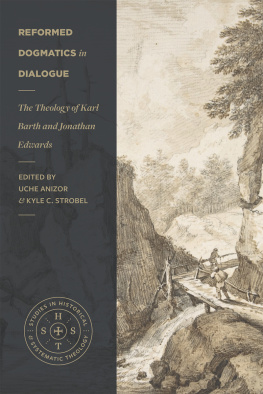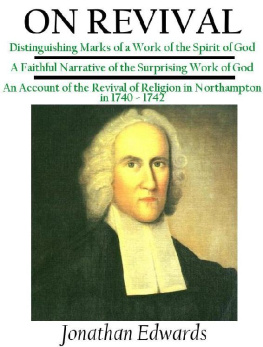1

A Journey to See Clearly
Those that are here upon earth are in a strange land; they are pilgrims and strangers, and are all going hence, and Heaven is their center where they all tend.
J onathan E dwards , M iscellanies 429: A scension
We know that when he appears we shall be like him, because we shall see him as he is.
1 J ohn 3:2

W E TALK A LOT ABOUT the journey. Turning to journey imagery was a reaction against the belief that salvation was primarily about conversiona moment of accepting Christ into ones liferather than about the entirety of life under God. Journey imagery is a biblically fruitful attempt to refocus salvation on presenting our entire lives to God (Ps 5:8; 25:4-5; 27:11). Yet it would be a mistake to assume that this imagery is new. Rather, we have tapped into a deep-rooted tradition in church history. Closest to our own context are the masters of journey imagerythe Puritans. Out of the Puritan movement we receive the spiritual classic Pilgrims Progress . The idea of a pilgrimage to heaven as the framework for grasping spirituality is one of the great emphases of Puritan theology. Likewise, Jonathan Edwards focuses on the image of being a pilgrim in a land that is not truly our home.
This use of journey language raises questions of where we are going and how our destination informs how we travel. The church has historically understood our destination as either heaven or hell. For Edwards, heaven and hell are not merely places, but realities whose powers are known now . Heaven and hell are fueled by love and hate respectively. Heaven is a world of lovea realm of beauty where faith, hope and love know their fulfillment in a family of people drawn together to the God of love. God, as Edwards never tires of telling his readers, is a fountain of love. The eternal and infinite love of God quenches the thirst of all who draw near. In drinking deeply from this fountain, love of God and neighbor finally reign perfectly. Hell has no such fountain; it is the natural consequence of a society of selfishness. Rather than remaining on the outskirts of our world, heaven and hell assert themselves in our lives. Those who know God, as revealed in Christ Jesus, have a piece of heaven abiding in them. The Holy Spirit, or Gods own love, is given to believers in salvation. The fountain that abides in heaven pours forth through the lives of believers now. Unbelievers, in contrast, will ultimately bear the fruit of the place to which they journey. Those who do not sit and drink at the fountain of love will ultimately have hate abide in their souls. For those who do not know God, selfishness will eventually win out in their hearts; the forces of hell will run rampant in and through them to the world.
Everyone is a pilgrim. Everyone is journeying somewhere. In the fall, humankind set out on a pilgrimage to hell because people lost the Spirit of God communicating the love of God to their hearts. Their hearts, our hearts, have collapsed into themselves, pushing our selves to the center of reality (and pushing God to the outskirts or even to nonexistence). Hell exerts its influence through people in the world, forming cultures, societies and families. In Christ, believers are put on a different path altogether. This path is not simply a different mindset. God implants a piece of heaven in his people so that they are brought from death to life. Gods own Spirit is given as the Spirit of love, so that the redeemed will live out the way of heaven in the world now. The focus on the present reality of heaven and hell does not, in some way, raise the question of their existence. Far from it. The present realities of love and hate are proof that heaven and hell are realso real, in fact, that their ways of life bleed into ours.
To journey well in this life, it is important to meditate on the direction your heart is pointing. What realm serves as the true north to which your heart finds its bearings? To live a heavenly life now, one must set your minds on things that are above, not on things that are on earth (Col 3:2). The things that are above do not primarily reference a place, but the Father, Son and Holy Spiritthe triune God. We must turn our attention to the source of the heavenly life so we can live the way of heaven here. To do so, I focus our attention on being with God in glory. Heaven is only heavenly because God is there. He is the spring of love that gives life and direction to that place. The life we know now is still given direction by that same source of life and love. God is the only source of the heavenly life, and therefore to grasp the nature of the Christian life we must grasp what it means to know God .
As a child, I loved to go to restaurants so that I could play the games on the back of the childrens placemat. Inevitably, one of those games would be a relatively simple maze. Before too long I realized that it was easier to start at the end, to see where I was going, as a way to figure out how best to avoid pitfalls and dead ends along the way. I am doing the same kind of thing in this chapter outlining what it means to become oriented to the God of heaven, where a believers journey ends, so that we can live a heavenly life here. To better grasp our present life, in other words, we start at the endat the perfection of this life in glory. By starting at the end, we paint the journey of the Christian life with broad strokes, which are then fleshed out throughout the rest of the book. This chapter maps the ground we will cover on our journey, and the remaining chapters, in one way or another, offer directions, equipment and sustenance for the pilgrimage set before us.
When We Will See
The Christian life is not abstracted away from heaven, but is directly connected to it. In fact, our heavenly and earthly lives are not two different journeys, but are two phases of the same pilgrimage. Heaven is not a static realm where we arrive at eternity only to finish learning, loving and, well, living . Rather, heaven is the place where God is known perfectly , but not fully.
Let me explain. Continuing with the image of God as a fountain, we can see ourselves in heaven as buckets who are full of God. Since we are full, we are perfectly satisfied, but our capacity continues to grow in heaven. We become larger buckets. We continue to learn more about God and love God more and more. As our capacity grows, we remain perfectly full, but since God is infinite he is never fully known. We are always growing and eternally expanding in our desire to know God and love him moreand yet our satisfaction never wanes, but increases exponentially. Heaven is a journey with God where we grow in love and knowledge of him for eternity; where our own love abounds to others in a society of love. Therefore, the term heaven refers to the day when love of God and neighbor reign unhindered.
When we try to talk about heaven, we run into a problem: there simply isnt all that much information. Interestingly, in the Western tradition there is a broad sense of agreement, among both Catholics and Protestants, that in heaven we will participate in what is called the beatific vision. Whether you look to John Calvin, Charles Hodge, John Owen or Jonathan Edwards, the focus of eternity is on coming to see God face to face. The word beatific is not some magical or mystical term, but points to the effect of seeing God. A sight of God, Edwards tells us, is happifying (which is what beatific means); it causes happiness to well up inside of the person. It would be foolish to think that seeing God is uninteresting, or maybe interesting only in an academic sense. Seeing God fulfills the design of humanity and therefore sets the mind and heart into motionit happifies. Seeing God brings a person to complete satisfaction. Note Edwardss depiction of this sight of God:












